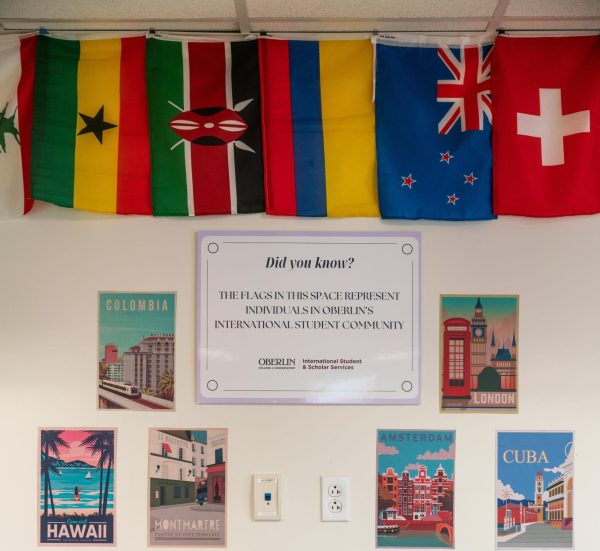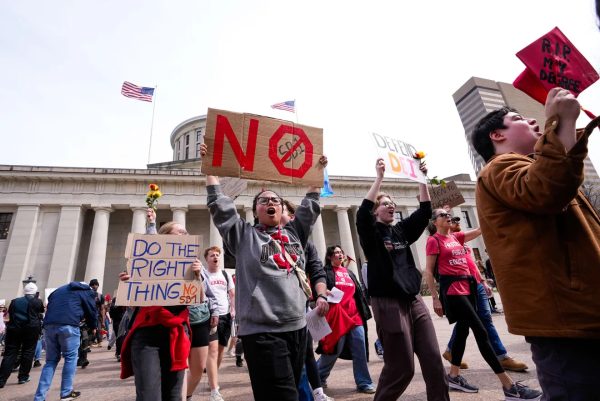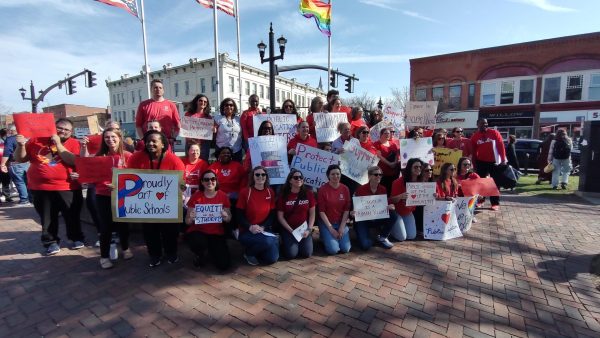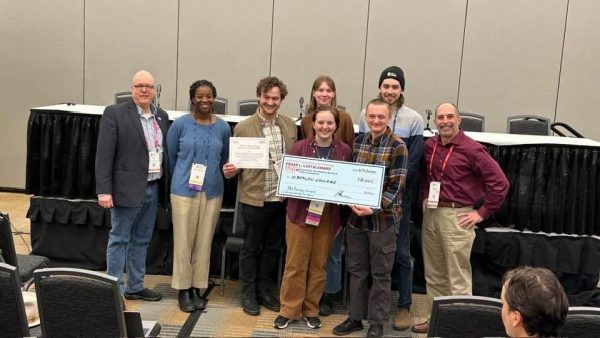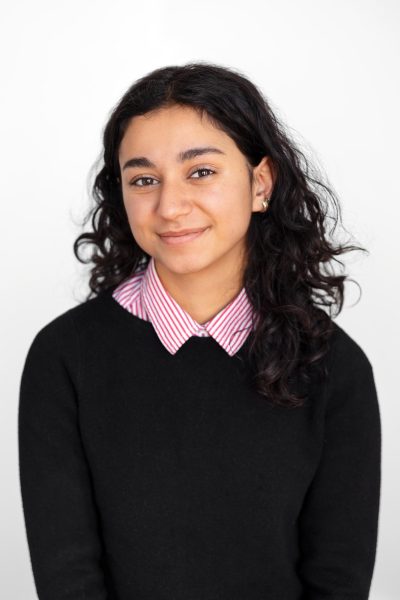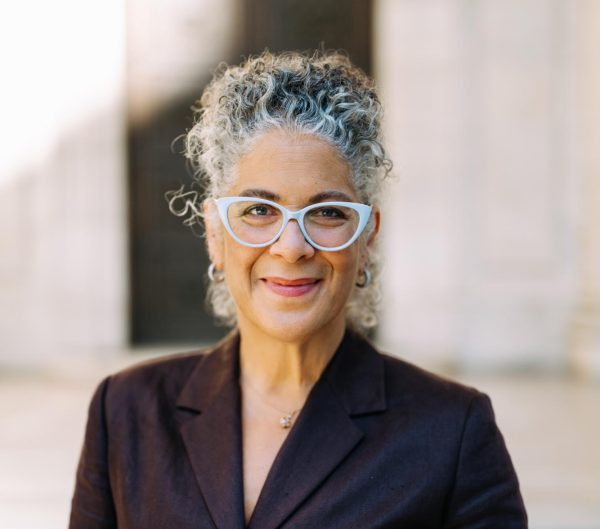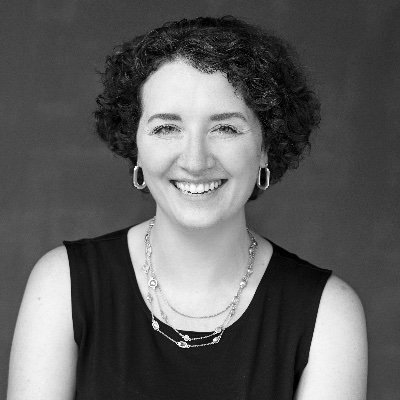Off the Cuff: Melissa Harris and Christian Bolles, Editors-in-Chief
College seniors Melissa Harris and Christian Bolles are the outgoing Editors-in-Chief of The Oberlin Review. Harris has been involved with the Review since her first semester at Oberlin, when she started out her journalism career as a staff writer. Since then she has worked as a Review Production Editor and News Editor and has interned for publications such as The Chronicle Telegram and Homeland Security Today. Bolles got involved his sophomore year at Oberlin and served as an Arts & Culture Editor before his tenure as EIC. Bolles is most known for his movie reviews. They were interviewed by the incoming Editors-in-Chief, College junior Sydney Allen and College sophomore Nathan Carpenter.
This interview has been edited for length and clarity.
Nathan Carpenter: What accomplishment over your time at the Review are you both most proud of?
Christian Bolles: I published a piece as Arts Editor about the state of the Cinema Studies program at Oberlin, and that had a pretty outsized reaction which was interesting to grapple with. But it also just made me realize the potential impact of journalism, especially on a small campus such as this one where it seems like there’s something — some little discrepancy, point of neglect — lurking around any corner. It made me realize what a great responsibility we have here.
Melissa Harris: One of my prouder accomplishments was reporting on worker issues. [Production Editor] Eliza Guinn and I wrote a story about how the unions and the administration were at odds at the beginning of spring 2017, and then I followed up with a story about the Bon Appétit [Management Company] boycott in the May of last year. This semester, I wrote about how the closure of Dascomb Dining Hall is affecting workers. Really getting to connect with those folks and represent them through the Review has been something I’ve been very proud of.
Sydney Allen: Can you talk a little bit about why you both have dedicated so much time to student journalism? Why is it important to you?
MH: The reason why it was really important to me at first is because as I became more involved, I would become more connected with different people and communities that I wouldn’t necessarily have interacted with. That was an important point for me, especially finding my bearings here at Oberlin as an underclassman. As I started working here, the Review sort of became like a family to me. The paper itself and the community around the paper is something that has given me a lot, so I want to give it a lot as well.
CB: In the moment, it’s really amazing to be part of — like Melissa said — the Review family, but it’s also really cool to feel like you’re one stop on a much longer progression. Maybe some of the things that we’ve done here will stay decades from now, and that would be amazing. It’s really great to be a part of it.
NC: To shift gears a little bit, I wanted to get both of your thoughts on Oberlin’s current direction — what you both are excited about for the future of Oberlin, and what your concerns are, based on insight that you’ve had over your time at the Review and as Editors-in-Chief for this year.
MH: I feel confident in the work that Student Senate is doing and how the administration is taking greater strides to be more communicative with the campus. But at the same time, we see how things are sometimes falling through the cracks, like the situation with ResEd we reported on last week was definitely faulty. While I am confident, I think that we still need to be wary and hold all groups accountable, and that’s what we do through our work at the Review. We point out where things are going positively and where things are not.
CB: All we’ve seen so far is the beginning of this process of financial readjustment, and I think that Oberlin is in a position to set an example for how to deal with these issues and to prove that the liberal arts are sustainable. I think that we have the right team to do it. I think that we have the right student body to do it. I think that Oberlin really does have the opportunity to set an example, so I think we’ll do that.
SA: I wanted to ask you both what each of your favorite Oberlin memories are from your time here.
MH: Honestly, being in this office has been some of the greatest memories I’ve had. I feel like the Review has been a great rock for me. Even though it’s a lot of hard work, I also love the people I work with — they’re my friends. I think also being involved with [Filipinx American Students’ Association] has been really great, because I’ve never had a solid Filipino-American community to be around and it’s really gotten me in touch with myself and also my academic work. Our banquets have always been a highlight for me every year.
CB: There are a lot, and the Review definitely ranks very high on that list for me. I feel like, and this is probably true of a lot of colleges, but Oberlin to me just feels like this constant process of discovering new communities and experiences and everything that you never really appreciated until a particular moment. And for me, this past semester, that’s really happened with the [Allen Memorial Art Museum]. I’ve been doing this provenance research project and collaborating with curators, especially Andria Derstine, the [John G. W. Cowles Director].
MH: Oberlin-in-London was also one of my best semesters ever.
CB: Yes. Agreed.
NC: Yes, yes, yes, yes, yes. (Editor’s note: Harris, Bolles, and Carpenter all spent a semester abroad with the Danenberg Oberlin-in-London program at separate points in their Oberlin careers.) At the conclusion of your careers at the Review, what advice would you each give to aspiring journalists, at Oberlin and elsewhere?
MH: Be skeptical and curious, all the time, and you will find things. When you notice that there are not answers, pursue those answers. And do it in a way you think will be effectively communicated to those around you, or however you think you can best communicate it, whether through print or podcast-form or broadcasting. Do your thing, but always be curious.
CB: I would say be relentless. It’s tempting to feel like you can only get so far. But also, what I was talking about Oberlin being a place that fosters all of these really specific connections to people — there are almost infinite ways around those systems. I think that at the Review we kind of trade in those alternate paths. Whether you’re working for the Review or another publication or just going off and doing your own thing, just find new paths, and you will always be able to get to some kind of an answer.
SA: What would you guys have done differently in your tenure at the Review? What’s a challenge you faced that you would have done differently?
CB: One of the most amazing things about the Review is that it’s pretty much completely student-run, and then one of the hardest things about being Editor-in-Chief of the Review is the fact that it’s almost completely student-run. Every decision that has to be made, the responsibility ultimately falls on us. It is our paper and in our time here, there have been controversies and difficult situations. I feel like in any situation where not everybody ends up happy, you’re always going to wonder what you could have done differently, and that’s something that always falls on the leadership of any publication.
MH: One of the things that I’ve realized is that having connections and knowing the contact information or points of contact of different people who could be key for articles is something very dire. Since people have very short tenures here because students are only in college for four or so years, it’s really difficult to do that. It’s really hard to, like Christian said, simultaneously be a student and a journalist, because you have to critically report on people who are your peers and friends, and you get slammed for it sometimes.
NC: Can you both tell us what your plans are post-graduation?
MH: I have a variety of potential plans. I’ve applied for various journalism positions throughout the country — some are where I live in the New York-New Jersey area, because it’d be nice to be close to home for a while. Regardless, I will definitely stay in touch with the Review, because y’all are my family.
CB: I am still in the planning stages for this, and I’ll actually have things nailed down on Friday in-between finishing production and publishing the paper, so I’m going to be as “probably” with this as I can, even though it’s very likely. I will probably be continuing my provenance research and other projects with the museum over this summer. Hopefully after that point I’ll be able to continue similar research at another institution, because I’ve gotten a lot out of my contact with journalism here, and I think it’s really important to tell stories that aren’t being told.
MH: We’re also flirting with the idea of a sitcom about a college paper because — that’s something that we joke about — it’s hellishly funny to work at a student paper, especially The Oberlin Review.
CB: Oh, it has a name and everything, it’s happening.
SA: That would be so cute.
CB: It’s gonna happen. It’s definitely not just gonna be cute.


